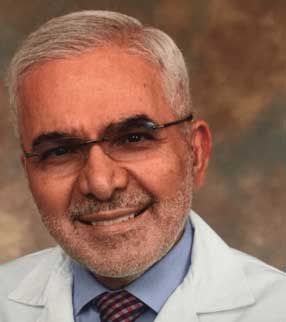Psychiatry
My Journey to the Psychiatrist Who Changed My Life
Personal Perspective: Finding effective treatment for schizophrenia.
Updated December 30, 2023 Reviewed by Kaja Perina

As 2023 draws to a close, I ponder what I am the most thankful for. The person who made the greatest impact on my life was my psychiatrist, a University of Cincinnati professor named Henry Nasrallah. Prior to knowing him, I struggled greatly to find any hope for my future at all, let alone effective treatment.
"Permanently and totally disabled"
When I was finally picked up from the churchyard where I was living and taken by police to be observed in a psychiatric ward, I believed I would be discharged immediately. Unaware that anything was wrong with my mind, I was confident of my good mental health.
The psychiatrist who initially diagnosed me saw me as a dirty homeless person, just taken off the streets. After about 36 hours, he told my parents to lower any ambitious expectations we had about my future, as I would be permanently and totally disabled, due to severe schizophrenia. Looking back, however, he never said this to me. In fact, I don’t think I was ever told what my diagnosis was during my first two-and-a-half-week hospitalization in Los Angeles.
The psychiatrist did not believe I was being honest about certain events of my life. While homeless, I had convinced friends to pay for me to attend a conference on politics in the United Kingdom, and to take a follow-up trip to the UK. I had also traveled to Taiwan with a friend for two weeks. In order to convince him that I was telling the truth about my international travels, I had to retrieve my passport from the locked box at the bank where I stored it. When he didn’t believe me, I didn’t like or trust him.
I was not told why I was required to take meds, what the meds were supposed to do, or potential side effects. I was also not told that another medication might be a better choice if I did experience refractory symptoms or certain side effects. Looking back, I remember being told one thing: You will probably be on this medication for the rest of your life. Upon hearing this, I refused to believe it. I thought that since the staff didn’t know me at all, they simply didn’t realize I was not actually in need of medication.
Post discharge, when the intolerable side effects of my medication showed up (restlessness, sedation, an uncontrollable appetite, blunted affect) like most first episode schizophrenia patients, I quickly discontinued my medication. Because no one had pointed out to me what positive effects I might experience from the medication, I was unaware that it had helped me at all. In hindsight, I know it had actually helped significantly, but I still believed it had done nothing.
This first psychiatrist was supposed to be my first partner in recovery. But because I disliked him, I became even more adamant that I would never take meds.
"It’s your own fault"
After my first hospitalization in Los Angeles, I returned to Cincinnati to recover at my parents’ home. At that time, I noticed that my antipsychotic medication gave me a voracious appetite, and despite my best efforts, I could not control it. I remember my new Ohio psychiatrist asking me why I could not just stop eating. He did not recognize how the medication affected my body.
He decided to add another medication at a very low dose. Though this could have been a good idea, it led to a reoccurrence of hallucinations. Several weeks later, he announced that I was too complicated, and he dropped me as a patient with no referrals, before I could even begin to start looking for a new doctor. Without a doctor, the emergency room became my only option for help, and I remember visiting the ER five times during the following months with my dad.
Institutionalization
On my fifth visit to the ER, the staff finally admitted me as an inpatient. Looking back, I wish I had a psychiatrist to work with so that another hospital stay could have been avoided.
While hospitalized, I actually requested the medication I had been given months back with the terrible side effects, because I realized it was the only thing that could control my psychosis, and keep me out of the hospital. During this hospital stay, my attending hospital physician excitedly told me about a new psychiatrist he had found for me post discharge. He said I would love this new doctor.
Several weeks after leaving the hospital, when I saw my new psychiatrist, I was overmedicated and fatigued. That day, he made it clear to me that people with schizophrenia do not recover. Like the first doctor I saw, he affirmed that work, school and independent living would all be impossible. He talked to me like a child, slowly, and condescending. He said the next step in my life was to enter a day program. I was frustrated by this suggestion, as I had repeatedly told him I was sleeping at least 16 hours a night, which would make attendance impossible.
I also did not want to be in a day program. I had already spent years isolating myself from mainstream society. I had a strong desire to rejoin regular life. I wanted to spend my days with healthy people who would stimulate my mind. I also wanted to return to school and work a job. My parents supported my right to make my own decision. Of all the doctors I met, this one was most certain I would never get back my life.
Finding Hope
However, when all hope seemed lost, a psychiatrist at the University of Cincinnati agreed to consult with the psychiatric physician who had recommended the day program. This psychiatrist, an internationally recognized expert on schizophrenia named Henry Nasrallah, researched my history extensively. He learned about my violin achievements, academic achievements and research publications. Unlike the other psychiatrists in my life, his goal was to return me to my baseline. Dr Nasrallah recommended a highly underutilized antipsychotic medication. Within six months, I was fully recovered. Soon after, I returned to college. Three years after beginning the medication, I graduated magna cum laude in molecular biology.
After my graduation, Dr. Nasrallah encouraged me to write a book about my journey of recovery which I did and published. In 2016, we established a foundation to offer medical information and hope to the seriously mentally ill and their families.
What I learned about seeking treatment
It can be challenging to find a psychiatrist. There is a shortage, and it is typical to be put on a waiting list for months. However, a struggling person should still seek a doctor who will help them build a recovery-based wellness plan with the lowest possible side effects. A good psychiatrist is one who will work intensely with a person to achieve the highest level of recovery possible. If you feel that your doctor believes people with schizophrenia cannot recover, it may be time to search for a new psychiatrist or nurse practitioner.
As we begin 2024, I hope to convince more psychiatrists that recovery is indeed possible for many of us who struggle with severe schizophrenia. We need more doctors to step up to the plate, and go the extra mile for their struggling patients, never giving up hope for a better life.
I am greatly thankful for a psychiatrist who would not lower his expectations. He brought me to full remission, and enabled me to live the wonderful life I enjoy today in long-term effective treatment. He has dedicated his life to educating other clinicians. In 2024, and throughout the next decade of my life, I hope to see more doctors choose to raise their expectations for schizophrenia recovery. To this end, I will work faithfully as an advocate for recovered lives.
To find a mental health professional near you, consult the Psychology Today Directory




